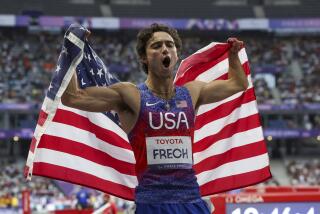How Much Glitter in All That Gold? : The Rush Is On in the Search for Crossover Stardom
- Share via
The Summer Olympics in Seoul are winding down, but the gold rush for high-profile medal winners in the Games is under way. Personal endorsements, TV commercials, and appearance fees for medal winners rise as records fall.
Suddenly famous athletes can command millions of dollars’ worth of endorsements after the Closing Ceremonies. (Ben Johnson, the de-medaled Canadian sprinter who was disqualified for use of prohibited drugs, lost a reported $10 million in contracts from canceled advertising and endorsement deals.)
But for the Greg Louganises, the Florence Griffith-Joyners, the Matt Biondis, and the Janet Evanses of the ’88 Summer Games, the step from Olympian to show-biz performer can be a leap longer than any jump by Carl Lewis, the Olympic long jumper who has a musical career in mind. Remember 1984 Olympics gymnast champion Mitch Gaylord. Now remember his 1986 feature film debut, “American Anthem.” To his credit, though, Gaylord is carving out a career as a TV host.
Other ex-Olympians have tried to make their marks in the entertainment industry: Mark Spitz, Mary Lou Retton, Dorothy Hamill, Bruce Jenner. But a combination of factors--lack of the right roles, over-commitment to commercials, or audience resistance--kept them from nabbing the entertainment gold.
Movie and TV agents and representatives asked about the chances for stardom among the current crop of American Olympians all stressed the importance of training: practice in eliminating diction problems, in learning the rudiments (at least) of acting, and in making the rounds and rounds of meetings necessary to show that the athlete is serious about making the switch.
“These people have to realize that the same sort of trajectory that got them into the Olympics--hard work, lots of time, more hard work--will be required of them as performers and actors,” said Jim Berkus, president of Leading Artists Agency, who added that he believed swimmer Matt Biondi had the most potential as a crossover, likening him to actor Kevin Costner. “You want to avoid involving them in the quick-buck media blitz. It just doesn’t work.”
“The athlete has to show they’re serious about making it for us to look at him, and the best way to show that is to invest time,” said Brian Gersh of Triad Artists, who also singled out Biondi and mentioned U.S. volleyball team captain Karch Karaly as well. “But it takes an extraordinarily special person to make that time pay off into something successful, and all the time in the world can’t make you into something you’re not.”
The odds of crossover success are so long that other entertainment agents contacted dismissed the idea altogether, with one calling the notion “a total crap shoot that never goes anywhere” and another adding, “They promise these jocks films and then wind up getting them commercials for jeans and after-shave.”
Commercials, talk-show appearances and the odd guest spot on TV series do improve visibility, said Jeff Darman, a Washington-based sports marketing consultant. “If you sense there is star quality, you want to go right away,” Darman said. “But you can’t go overboard. After mistakes like that in the past, you can’t even get close to overkill now . . . (but) it is essential to get the face out there if other work in the industry (is going to) follow.”
Both Berkus and Gersh mentioned smaller parts in feature films with experienced directors as ideal first crossover vehicles. “You also want to develop properties for them that make the connection to what made them famous--diving, swimming, whatever--without banging you over the head. Sending Greg Louganis into a meeting for a film about a stockbroker wouldn’t make any sense at the beginning.”
Added Berkus: “I’d steer them away from the guest spots of TV. Audiences burn out on you really fast that way.”
Nor is the self-professed willingness of an athlete like Louganis, who was scheduled to do stand-up comedy at the Improv Thursday night and says he wants to work in show business, necessarily enough to get the ball rolling. Said Gersh about Louganis: “He has the will, no doubt, and he’d be good for certain things. But I’d want to meet with him for a good long sit-down to find out the real depth of his commitment to being a non-diving performer.”
As the highest-profile American woman athlete in Seoul, Griffith-Joyner has the added viabilities of fashion and glamour to invest in her future. Her business manager, Gordon Baskin, said that no small number of fashion designers and perfumers are interested in Griffith-Joyner, but added, if she wanted to pursue work in the entertainment field she wouldn’t be denied.
Added Lacy Ford of the Ford modeling agency in New York: “(Griffith-Joyner) could have a tremendous influence and impact on the fashion business. There aren’t many designers or spokespeople in fashion who can really be pointed to as heroes, but she would definitely be one of them.”
Ironically enough, it’s the real-life stories of failure or controversy at the Games that most often get made into TV movies. Sprinter Johnson’s story of woe is reportedly up for consideration because, as one agent put it, “People are dying to learn what they imagine to be the real truth of the matter.” The same agent, who asked not to be identified, said that the upcoming exclusive interview with Johnson by the West German magazine Der Stern (Star) will be “read all over Hollywood, even if people can’t speak German.”
More to Read
Go beyond the scoreboard
Get the latest on L.A.'s teams in the daily Sports Report newsletter.
You may occasionally receive promotional content from the Los Angeles Times.






